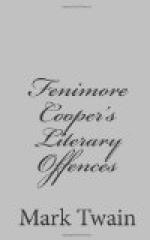“‘No, no, Major,’ said he, confidently, ’that would be a risky declaration. I didn’t load the piece, and can’t say what was in it; but if it was lead, you will find the bullet driving down those of the Quartermaster and Jasper, else is not my name Pathfinder.’
“A
shout from the target announced the truth of this
assertion.”
Is the miracle sufficient as it stands? Not for Cooper. The Pathfinder speaks again, as he “now slowly advances towards the stage occupied by the females”:
“’That’s
not all, boys, that’s not all; if you find the
target
touched
at all, I’ll own to a miss. The Quartermaster
cut the
wood,
but you’ll find no wood cut by that last messenger.”
The miracle is at last complete. He knew—doubtless saw—at the distance of a hundred yards—that his bullet had passed into the hole without fraying the edges. There were now three bullets in that one hole—three bullets embedded processionally in the body of the stump back of the target. Everybody knew this—somehow or other—and yet nobody had dug any of them out to make sure. Cooper is not a close observer, but he is interesting. He is certainly always that, no matter what happens. And he is more interesting when he is not noticing what he is about than when he is. This is a considerable merit.
The conversations in the Cooper books have a curious sound in our modern ears. To believe that such talk really ever came out of people’s mouths would be to believe that there was a time when time was of no value to a person who thought he had something to say; when it was the custom to spread a two-minute remark out to ten; when a man’s mouth was a rolling-mill, and busied itself all day long in turning four-foot pigs of thought into thirty-foot bars of conversational railroad iron by attenuation; when subjects were seldom faithfully stuck to, but the talk wandered all around and arrived nowhere; when conversations consisted mainly of irrelevancies, with here and there a relevancy, a relevancy with an embarrassed look, as not being able to explain how it got there.
Cooper was certainly not a master in the construction of dialogue. Inaccurate observation defeated him here as it defeated him in so many other enterprises of his. He even failed to notice that the man who talks corrupt English six days in the week must and will talk it on the seventh, and can’t help himself. In the Deerslayer story he lets Deerslayer talk the showiest kind of book-talk sometimes, and at other times the basest of base dialects. For instance, when some one asks him if he has a sweetheart, and if so, where she abides, this is his majestic answer:
“’She’s in the forest-hanging from the boughs of the trees, in a soft rain—in the dew on the open grass—the clouds that float about in the blue heavens—the birds that sing in the woods—the sweet springs where I slake my thirst—and in all the other glorious gifts that come from God’s Providence!’”
And he preceded that, a little before, with this:




